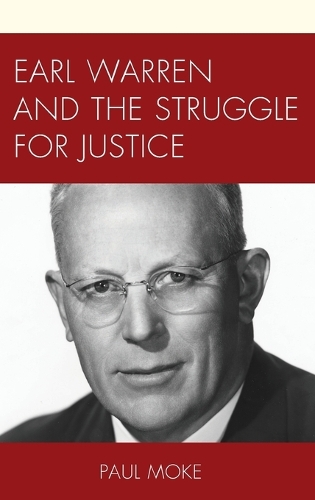
Earl Warren and the Struggle for Justice
(Hardback)
Available Formats
Publishing Details
Earl Warren and the Struggle for Justice
By (Author) Paul Moke
Bloomsbury Publishing PLC
Lexington Books
8th October 2015
United States
Classifications
Professional and Scholarly
Non Fiction
Legal systems: courts and procedures
Legal history
Political structures / systems: democracy
347.732634092
Physical Properties
Hardback
406
Width 163mm, Height 235mm, Spine 34mm
748g
Description
Few individuals did more to shape the political and legal landscape of twentieth century America than Earl Warren. Throughout fifty years of public service, Warren pursued a Progressive vision of ethical and effective government that brought moral integrity to the nations public policies, especially in the fields of racial relations, criminal justice, and freedom of marital association. Warrens path-breaking approach to legal writing and his management of the responsibilities of the Office of Chief Justice encouraged public understanding of and support for the work of the Supreme Court. But his controversial years in California state government and as Chair of the Warren Commission on the Assassination of President Kennedy also featured serious lapses in judgment and uncritical deference to authority figures in matters of national security that have clouded his legacy. This thoughtful and readable biography offers an updated and balanced appraisal of Warrens leading social justice decisions and a liberal critique of his failings that provides new insights into Warren, the man, the jurist, and the leader.
Reviews
Moke argues that Earl Warren was one of the central political figures of his time. Warren, who had been attorney general and governor of California, was chief justice from 1953 to 1969; he participated in the civil rights revolution that benefited African Americans, the cases that were meant to enforce the rights of criminally accused persons, and the court-ordered reapportionments of legislatures based on the one-person, one-vote principle. Mokes thesis is easily proven; Warren is considered so influential in these developments that the period is commonly called the Warren Era. Moke mines previously plundered archives and contributes some new material from the 1930s. . . .Moke makes a contribution, showing how the attorney general who supported the Japanese exclusion of 1942 developed into the author of Brown v. Board of Education in 1954 and how the prosecutor who carelessly disregarded the rights of accused persons in the 1930s grew into the defender of the Miranda warning. But in 1964, Moke notes, Warren failed to 'speak truth to power' as the chairman of the Warren Commission. Summing Up: Recommended. General readers and undergraduate students. * CHOICE *
The book presents additional insight into the work of the Warren Commission. * Wilmington News-Journal *
[An] insightful judicial biography. . . . Mokes biography provides an evenhanded appraisal of the Chief Justices shortcomings and misjudgments not only while on the bench but in his public service prior to and beyond the high court. An equally important contribution of Mokes book, possibly of greater value in this reviewers estimation, reminds us how the Supreme Courts approach to the law, often guided by its Chief Justice, matters. . . Hopefully, [the book] will. . . find a home in college and university holdings as well as public libraries; it deserves to be read. * American Review of Politics *
This book presents the details of Warrens life and career, including some of his best known Supreme Court decisions, in an accessible fashion. Persons without legal training will be able to get a good sense of Warrens contributions. Likewise, it responds, in a way that other books on Warren have not, to the conservative criticism of the Warren Court that has surfaced in the last decade. -- G. Edward White, University of Virginia School of Law
A thoroughly researched account of Warrens extraordinary life that draws on newly available original sources and provides a comprehensive portrait of his major contributions to 20th Century justice in the U.S., both on and off the bench. Mokes balanced work identifies Warrens great virtues and achievements as well as some critical failures, providing a scholarly perspective accessible to a wide audience -- Howard Tolley, University of Cincinnati
Earl Warren and the Struggle for Justice brings vividly to life the story of Americas most progressive chief justice, in all his humanity and brilliance. Relying on previously unexplored sources, Professor Moke traces the roots of Earl Warrens relentless belief in the dignity of every person and his determination to ensure that those who are poor and vulnerable receive a fair shake.This book is a marvelous reminder of what the Supreme Court can accomplish when it dedicates itself to making the words engraved above its entranceequal justice under lawa reality rather than a mere slogan. -- Daniel P. Tokaji, The Ohio State University Moritz College of Law
Author Bio
Paul Moke is professor of political science at Wilmington College.
